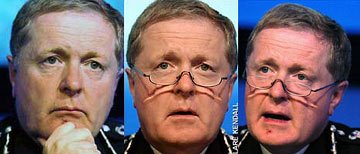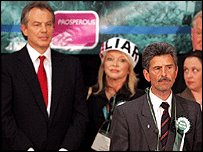 The Daily Mail delivers:When Mary Magilton told police a hit-and-run driver was fat, she didn't think she was being rude.
The Daily Mail delivers:When Mary Magilton told police a hit-and-run driver was fat, she didn't think she was being rude.
To her mind, it was merely an accurate description of the woman who had run into her on the pavement before driving off.
But to the police officer interviewing the mother of three about her traumatic experience, "fat" represented inappropriate language.
And she astonished Mrs Magilton by giving her a ticking-off for using the word.
Staff in the officer's force, Greater Manchester Police, have to abide by a 16-page document listing words and phrases which they should avoid so as not to cause offence, with suggested alternatives.
Terms such as policeman and spokesman are described as sexist while phrases such as "accident blackspot" and "a black look" are deemed negative.
The Power of Language Guide was introduced five years ago after discussions between the force and various interest groups.What a
fucking joke.Ah never mind, here are some new instructions for you to follow:


We have to reject this nonsense and not be afraid to. Here, read their shit yourself, and ask yourself is this really the best use of police time and your money ?
Page 1
Appropriate language policy
We are committed to maintaining the dignity of everyone with whom we come
into contact, and to promoting a professional and positive image of the force.
This is demonstrated by our Force Philosophy, our Equal Opportunities policy,
and now by our Appropriate Language policy. We are committed to making sure
all communications used by all our staff, both written and spoken, comply with
this policy. We will not use language which:
discriminates against or excludes individuals or groups;
displays prejudice; or
reinforces stereotypes.
Using such language is offensive, creates barriers and damages communication
between us and the people and communities we serve. We expect you to
challenge inappropriate language and will support you when you do so.
In particular, we will not tolerate under any circumstances officers or members
of support staff using terms which are:
racist or carry racist overtones;
homophobic; or
sexist.
Remember that your general demeanour and body language can give just as clear
an impression of you and of the force as the things you say or write.
Police officer or member of support staff
You should familiarise yourself with the Power of Language Guide. You should
actively challenge inappropriate language.
Manager or supervisor
You have additional responsibilities in ensuring that you:
implement and promote the policy;
actively challenge inappropriate language; and
take action if inappropriate language is used by your staff.
If you come across inappropriate language used by Greater Manchester Police
personnel you should inform the line manager of the person concerned.
Page 2
Action
If you become aware of someone using an unacceptable term you should take
action immediately. The Power of Language Guide will help you decide what
action to take.
You should inform the person that the language is not acceptable and explain
why, referring to the Power of Language Guide if necessary.
If the inappropriate use of language constitutes a racist incident, you must
complete a racist incident report form.
Monitor the person’s use of language in future and if appropriate review it as
part of the Personal Development Plan process with the aim of identifying
development needs.
If the language used is so offensive that the above action is insufficient, you
must initiate disciplinary action.
Contractors and personnel seconded from other forces or
organisations
If you are responsible for contractors or other visiting staff, you should inform
them about our standards of appropriate language.
Implementing the policy
Whilst any term which stereotypes or undermines individuals or groups is
unacceptable and will not be tolerated, there are some terms which are clearly
more offensive than others. The way you deal with incidents should reflect this.
The use of some terms may constitute a disciplinary or misconduct offence.
Member of support staff
You are under a contractual obligation to maintain acceptable performance and
conduct, and to comply with the provisions of the Code of Conduct. Greater
Manchester Police has an agreed disciplinary procedure which details the rights
under discipline, the right of appeal and so on.
Police officer
You are subject to an obligation under the Police (Conduct) Regulations 1999 to
comply with the code of conduct.
Maintaining consistency
It is the responsibility of the Assistant Chief Constable Community and Internal
Affairs and the Force Personnel Director to ensure that disciplinary action is fair
and just. Twice a year the Assistant Personnel Director (Policy) and the
Superintendent, Discipline and Complaints Branch will review cases to ensure
proportionality and consistency in decision making. We will share this
information between branches to ensure we are maintaining consistency. The
Equal Opportunities Unit will review the policy in September 2001.
Page 3
Scope of the policy and advice
We recognise that language is continually evolving, and that the acceptability of
certain words or terms may change. It is not possible to provide a definitive list
of which terms are acceptable and which are not. If you are unsure of the
acceptability of a particular word or term and you cannot resolve the problem by
referring to the Power of Language Guide, you can get advice from the Equal
Opportunities Unit or the Discipline and Complaints Branch.
Support
If you are subjected to or challenge inappropriate language, support is available
from a number of sources, details of which can be found in the:
Bullying and Harassment Policy; and
Grievance Procedure.
Access to the policy and ‘Power of Language’ Guide
The policy and guide are available to all staff and to any member of the public.
Both the policy and the Guide will be available on the intranet for Greater
Manchester Police staff and on the Greater Manchester Police internet site for
members of the public.
If you need copies of the Power of Language Guide in other formats, such as
braille and large print, speak to staff in the Equal Opportunities Unit who will
discuss your requirements.
Feedback from the public
Feedback from the general public is valued. Members of the public will be able
to give us feedback on appropriate language using a freepost address or the
Greater Manchester Police internet site. The Chief Superintendent, Community
Affairs Branch will co-ordinate our response to the feedback.
Human Rights Act compliance
We believe this policy to be compliant with the Human Rights Act and the
principles of the European Convention on Human Rights.
Page 4
Operational guidance
Police officer or member of support staff
It is essential that we lead by example in using terminology which is acceptable
to all sections of Greater Manchester’s communities, and which demonstrates
our commitment to promoting best practice and professional conduct.
We publish this guidance to help every member of the force to understand:
what language is acceptable and what is not; and
how to respond to inappropriate language in different operational
circumstances.
General duties
As well as encouraging the use of appropriate language inside the organisation, it
is also important that we respond in the right way to the use of unacceptable
language by people outside it. If Greater Manchester Police officers or staff are
seen to ignore seriously offensive language it could be extremely damaging to
our reputation and may call into question our commitment to good community
and race relations. You should therefore be prepared to challenge unacceptable
language used by members of the public and others outside Greater Manchester
Police, and if necessary to recommend suitable alternatives.
Clearly there are circumstances where the language should not be challenged, for
example for evidential reasons when interviewing suspects, or when it is not
sensible do so, such as when you speak to distressed victims.
You should also be aware that in some circumstances your actions and words
may be recorded, for example by Closed Circuit Television, the media or by the
public. This is a powerful opportunity to demonstrate our commitment to profes-
sional and appropriate language and behaviour.
Witness statement from member of the public
When taking a witness statement from a member of the public, be aware of the
evidential need to record the witness’s exact words. Use speech marks to show
the words used by the witness, especially those giving descriptive information.
Doing this will make sure the statement is recorded in the witness’s own words.
Statement made by police officer or member of support staff
When you make a witness statement yourself you should not use inappropriate
language in any part of the statement written in your own words. To show
something said by another person, write the exact words and put them in speech
marks.
Page 5
Greater Manchester Police Computer Systems
The information recorded on Greater Manchester Police computer systems is
disclosable. If the information has evidential value, the meaning of words must
not be changed by ‘sanitising’ the language used by suspects, witnesses or infor-
mants. Enter the words in speech marks exactly as they were spoken.
Area Operations Rooms
Creating a new incident
The 'Summary Heading' field should contain a succinct but informative heading
relating to the incident. The words or phrases used in this section must comply
with our Appropriate Language Policy.
Enter further details in the 'message' field outlining the incident as described to
you by the caller. The message field must contain all the relevant information
used to describe suspects, offenders, the incident witnessed and so on, in the
exact words of the caller. If the caller uses inappropriate language, show his or
her words in speech marks, clearly indicating that the words are those of the
caller, not a member of Greater Manchester Police. If the caller uses swear
words, record them only if they are relevant to describe the circumstances or
events, and show them in speech marks. In other situations, swearing should be
covered by a comment, such as that the caller was abusive.
Radio operator, subsequent radio communications
You should not relay messages on air using the caller’s exact words if the caller
has used inappropriate language. Our radio transmissions can be intercepted and
anything said over the air may be attributed to Greater Manchester Police.
Where the context of the language used is important, best practice is for the
officers attending to:
view the incident record and then speak to you;
go to a telephone kiosk and speak to you directly; or
speak to you using a Greater Manchester Police mobile phone.
Remember that the inappropriate or prejudicial nature of any language used
might be important information that the officer attending the incident should
know.
Area Operations Room operator - inappropriate language used by
Greater Manchester Police officers and staff
Where an officer or support staff member uses inappropriate language in
communication with the Area Operations Room, you should record the language
used in speech marks. Information describing suspects or offenders may have
evidential value and should not be changed.
Page 6
Supervisor
If you come across inappropriate language used by Greater Manchester Police
personnel recorded on the computer record of the incident, you should inform
the line manager of the person concerned.
Public order situations, sporting and public events
The law provides specifically for situations where racial or indecent language is
used in public. The most common offences are listed below.
Public Order Act 1986 (Public Order Act) offences:
Causing fear or provocation of violence (s.4) or causing harassment alarm and
distress (s.4A and s.5), through the use of threatening, abusive or insulting
words, behaviour or the display of material. Clearly, words or material of an
indecent or racist nature can fall within this category. The Crime and Disorder
Act 1998 created new racially aggravated offences based on Public Order Act
offences. The new offences were:
An offence under section 4 Public Order Act (causing fear or provocation of
violence);
An offence under section 4A Public Order Act (causing intentional
harassment, alarm or distress);
An offence under section 5 Public Order Act (causing harassment, alarm or
distress).
An offence is racially aggravated if:
at the time of committing the offence, or immediately before or after doing
so, the offender demonstrates towards the victim of the offence hostility
based on the victim's membership (or presumed membership) of a racial
group; or
the offence is motivated wholly or partly by hostility towards members of a
racial group based on their membership of that group.
The Football (Offences) Act 1991 provides offences which may be committed at
a designated football match. Section 3 creates the offence of ‘indecent or
racialist chanting’. It states: “It is an offence to engage or take part in chanting
of an indecent or racialist nature at a designated football match.
'Chanting' means the repeated uttering of any words or sounds whether alone or
in concert with one or more others. 'Of a racialist nature' means consisting of or
including matter which is threatening, abusive or insulting to a person by reason
of his or her colour, race, nationality (including citizenship) or ethnic or national
origins.
Page 7
Enforcement of these offences and compliance with the Human
Rights Act 1998
Article 10 of the European Convention on Human Rights as incorporated in the
Human Rights Act 1998 provides for the right to freedom of expression. In
Handyside v UK (1976) it was held that the freedom of expression applied not
only to information or ideas that were favourably received or regarded as
inoffensive, but also to those that offend, shock or disturb the state or any sector
of the population. There is obviously a balance to be struck between the right to
freedom of expression and the conflicting rights of others in a democratic
society. In deciding whether an arrest or reporting for summons is the right
course of action you should ask yourself:
Is what I am doing legal? The offences and powers for constables are clearly
defined in statute.
Is what I am doing necessary and justifiable? Are you using the law for a
legitimate aim, such as to prevent disorder?
Is the action that I am taking proportionate? Is the interference with the
individual’s rights to freedom of expression and liberty proportionate to the
threat or problem you are seeking to prevent?
Overall, is what I am doing fair, both to the community and the individual?
You should record the reasons for your actions, whatever they are, in case you
have to explain your decisions later.
Police officers have the power to use their discretion in the exercise of their
duties. For major public or sporting events, you should refer to operational
orders and verbal briefings for guidance on the level of enforcement or discretion
that the officer in command judges to be necessary.
Meetings with the public, agency partners and people
outside Greater Manchester Police
If you attend meetings as a representative of Greater Manchester Police you
should be prepared to challenge inappropriate terminology used by others,
including members of the public, and to recommend alternatives. If the language
used is seriously offensive, you should openly challenge it.
You should handle such instances carefully to ensure that we do not lose
co-operation or damage relations with the public and our partners.
Recruitment interviews
If you interview a candidate who uses inappropriate language during the
interview, the circumstances will dictate the most appropriate course of action.
You should always probe the applicant further to clarify his or her views.
We accept that in some cases the use of inappropriate language may be due to
lack of knowledge rather than prejudice. In these cases it should not necessarily
result in disqualification, but should be recorded. If the applicant is appointed,
Page 8
you should recommend that the person is given guidance on appropriate
language as an essential part of his or her induction.
If a candidate uses extremely offensive language or uses language with malicious
intent, you should record it. The interview should continue but the applicant
should not be considered suitable for appointment within Greater Manchester
Police. You should discuss and agree this with the other members of the panel
after the interviews have been concluded.
If you are asked by a candidate for feedback following rejection in these
circumstances, you should discuss his or her use of inappropriate language and
level of cultural awareness, and offer constructive advice. Tell the person about
the importance of cultural awareness in policing the diverse communities of
Greater Manchester.
Promotion boards and assessment centres
If you sit on a promotion board, you should write down any use of inappropriate
language and raise it immediately after the board with the Assessment Centre
Manager. He or she will raise the issue with the Superintendent, Career
Development Unit, who will assess the language used, referring to the Power of
Language Guide, before either progressing it or referring it to the relevant
division or branch for action.
If a candidate uses inappropriate language, you should normally allow the board
to continue to see if further development needs are identified. If the language
used is extremely offensive, the board should be terminated.
If inappropriate language occurs during a group discussion exercise, it should be
documented and left to see if other group members responded and challenged
the language used. If the language went unchallenged, this should also be
documented and taken into consideration as part of the overall assessment of the
performance of participants. In either case, it should then be referred to the
Assessment Centre Manager and on to the Superintendent, Career Development
Unit, who will assess the language used, referring to the Power of Language
Guide, before either progressing it or referring it to the relevant division or
branch for action.
Detailed guidance on penalising unacceptable language can be found in the
National Police Promotions Board Rules and Syllabus.
Personal Development Plans and other developmental and
achievement plans
If you have concerns about the use of inappropriate language by a member of
your staff, you should raise it with the individual concerned. If developmental
needs are identified these should be included in the person’s Personal Develop-
ment Plan action plan. You should make more detailed notes and keep them for
the period of the person’s agreed action plan.
Page 9
Training
Training officer
It is vital that you in particular are fully up-to-date with appropriate language
guidance. You should use and encourage appropriate language and challenge
inappropriate language.
At the beginning of any course and while explaining course ground rules, you
should refer to the appropriate language policy and outline how the use of
inappropriate language during the course will be handled.
In some circumstances, for example role play or group discussions on diversity
issues, there may be a need to discuss or demonstrate inappropriate language. In
these cases, before the session starts, you should inform course participants that
this will apply for the purposes of that session.
If a student uses inappropriate language, other than for discussion or
demonstration in a session arranged for that purpose, you should deal with it
immediately. The way in which you deal with it should depend on the
seriousness of the language used.
If the language is extremely offensive, you should stop the class and challenge
the student’s use of language immediately, in the presence of the other course
participants. You should clearly identify the inappropriate language used, why it
is inappropriate and suggest acceptable alternatives before restarting the course.
You should arrange to see the individual outside the classroom environment, for
example during a break or at the end of the day, to discuss the matter,
considering and documenting any necessary action.
If the language is less serious, you should identify it at the time and use it as a
learning experience for the group. Refer course participants to the ‘Power of
Language Guide’ for further information. Challenges of less serious
inappropriate language should be swift and straightforward and should not
significantly affect the flow of the lesson.
If use of inappropriate language by a course participant is correctly challenged
by another course participant, you should support the challenge and provide
further information where applicable.
School liaison sessions
School liaison officer
Your role is that of an outside speaker invited by a teacher. The teacher should
remain with the class at all times while you are talking to them. Beforehand, you
should speak to the teacher about issues such as classroom control and shared
responsibilities, decide which of you will respond to inappropriate language used
by pupils and how it will be dealt with. The rules of the discussion should be
clearly explained to the pupils at the beginning of the talk.
Page 10
If, however, you are to talk about citizenship and anti-social behaviour, you
should identify and challenge inappropriate language used by pupils and explain
how its use may be a criminal offence.
Force publications and documentation
If you write any publication or documentation, whether for the force or your
local division, branch, section or unit, you should check it to make sure it does
not contain any inappropriate language. Help and advice are available from the
Equal Opportunities Unit or the Discipline and Complaints Branch.
Publications such as Chief Constable’s Orders are already checked as part of our
editorial policy.










